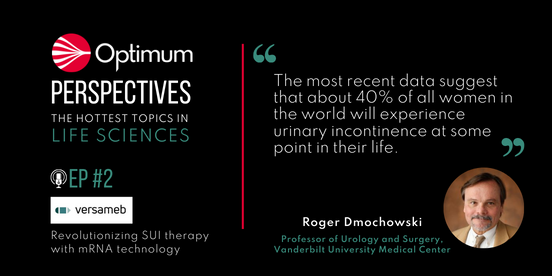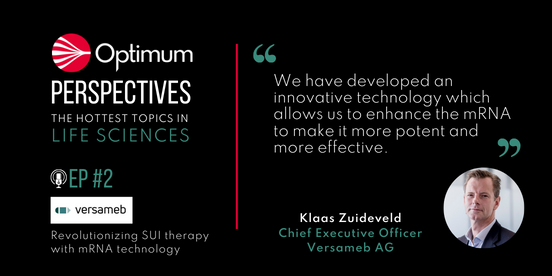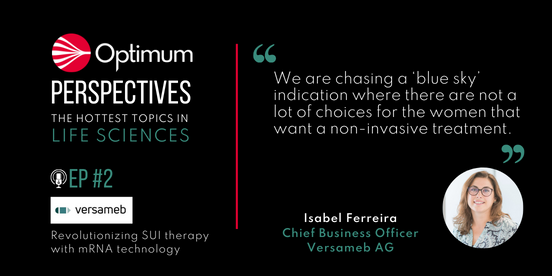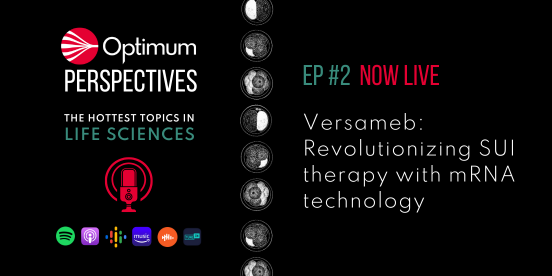Versameb: Revolutionizing SUI therapy with mRNA technology
Stress urinary incontinence (SUI) is a common and debilitating problem for many women, particularly after childbirth or in later years.
Yet despite this treatment options are limited, held back by a lack of research into medical products focused on women’s health.
But one biotech, Versameb, hopes to change this with a novel mRNA therapy that rebuilds the urinary sphincter and is about to enter clinical trials. Optimum Communications’ Richard Staines caught up with the Versameb team to find out more. 
Stress urinary incontinence (SUI) is prevalent condition in society – affecting up to 50% of older women – but despite this there’s a lack of effective or desirable treatments for a condition that has a huge impact on quality of life.
Roger Dmochowski, professor at the Department of Urology at Vanderbilt University in Nashville, pointed out that stress urinary incontinence is perhaps not the best use of the word “stress”.
It has nothing to do with psychologic stress, and instead refers to women who lose control of their urination related to the physical stress caused by movements including coughing, sneezing, laughing, running, lifting and changing position.
The most common causes are childbirth and pregnancy but it can also be seen because of the change in hormonal status related to the menopause.
Dmochowski, who is also on Versameb’s scientific advisory board, pointed out that the condition can cause them to shy away from social occasions, friendship circles, sporting activities, and damaging their quality of life. 
Available treatments include the famous Kegel exercises that strengthen the pelvic floor, specialist physiotherapy and a variety of devices, laser treatments and bulking agents.
Many of these treatments lack significant benefit and are limited in terms of their duration, according to Dmochowski.
“So surgery unfortunately is one of the most commonly prescribed initial treatments that women receive,” he said.
Surgery involves recreating the support of the urine channel or bladder but is associated with the usual risks, and usually don’t last more than 10 years.
Versameb CEO Klaas Zuideveld said: “We have developed an innovative technology which allows us to enhance the mRNA to make it more potent and more effective. Essentially you need much less mRNA and potentially have a safer drug.”
“Using a coding sequence for a growth factor we are triggering a regenerative process, so that the muscle can regenerate itself so that the damage done is actually repaired.”
It’s hoped that the treatment will be used once and that a benefit will be seen after a few weeks.
Animal studies have already shown a prolonged effect, preparing the groundwork for trials in humans. 
Versameb is in the process of submitting the Investigatory New Drug (IND) application to the U.S. FDA to begin clinical development.
Feedback from the FDA has been surprising and positive, said chief business officer Isabel Ferreira, and the regulator has allowed the company to move straight into a phase 2a clinical trial in women.
The IND is expected to be complete in the coming months, allowing for the trial to start before year end.
Versameb has managed this feat despite challenges raising finance for research into women’s health.
She said: “There is a general issue with investment in women’s health. Typically from the past investment has been much more focused on fertility and reproductive services. It has to do historically with the role of women in society.”
Ferreira cited a 2021 study from the U.S. National Institutes for Health (NIH) that found that it was disproportionately funding diseases that primarily affect men.
“This means that women’s health research depends a lot on outside investors to fill in the gaps. This also means that animal model primary research is just not happening in areas that affect women because there is not the funding available.
“Then it is much more difficult to fund startups in those areas because the research is not advanced enough and second of all for the investors to pick up on it because there is not enough experience on what it looks like and, from a market perspective, where it can take you.”
There are many diseases that are affecting women and not spoken about – Ferreira pointed out that women are unlikely to speak about urinary incontinence to everyone in the room. “It’s a very sensitive issue.” 
According to Zuideveld, it’s taken a special combination of characteristics to get Versameb this far – the right technology and science, innovation, the idea of where it makes sense to develop a drug and the right people on board.
“We are driven by wanting to develop a drug for areas of unmet need but with that comes failure and of course if things go well, comes success. Ultimately it’s about being able to develop a drug which works and which actually makes it to the clinic, I think that’s very rewarding in itself.”
With the VCs focusing investment on areas such as oncology and rare diseases, they often lack knowledge about diseases such as SUI, which have not attracted so many research dollars. 
Ferreira concluded that despite the challenges, developing a drug that treats the root cause of SUI could be immensely valuable for women and for society.
She concluded: “I think the pay-off could be huge because we are chasing what they call a ‘blue sky’ indication where there are not a lot of choices for the women that want a non-invasive treatment.”
“If we do have something I think it could be so impactful both for patients but also for the uptake from doctors and for the entire field.”
To find out more about Versameb, check out the Optimum Communications podcast, on which this article was based.
Follow us and subscribe for new episodes highlighting the latest innovation and developments in life sciences, with industry leaders of the healthcare sector.
Available on all major platforms: Apple, Spotify, Google, Amazon Music, Tune In, Castbox, Deezer and more! Follow and Subscribe today.

